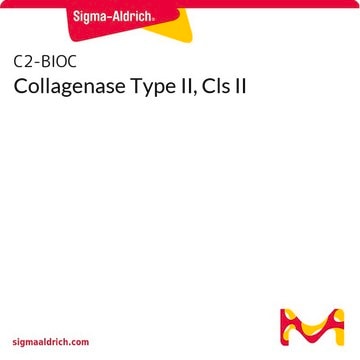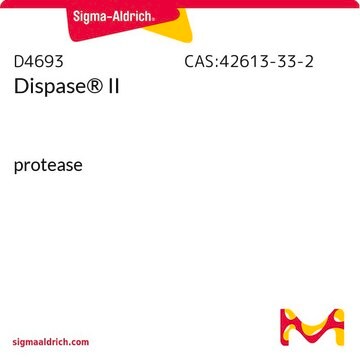C4-BIOC
Collagenase Type IV, Cls IV
Synonym(s):
Collagen A, Type IV Gelatinase
Sign Into View Organizational & Contract Pricing
All Photos(1)
About This Item
UNSPSC Code:
12352204
NACRES:
NA.78
Recommended Products
Looking for similar products? Visit Product Comparison Guide
General description
Collagenase Type IV, Cls IV is a member of the mammalian extracellular neutral metalloproteinases family. It digests type IV collagen, which is a major structural constituent of the basement membrane.
This product is identical to Biochrom GmbH part numbers C4-22 and C4-28. Enzyme blending from collagenase, clostripain, with tryptic and proteolytic activities. Recommended for the isolation of Islets of Langerhans. Specific activity is 125 to 250 Mandl units per milligram of powdered substance.
Application
Collagenase Type IV, Cls IV may be used:
- as a component in Dulbecco′s modified Eagle′s medium (DMEM)/F12 to digest endometrial samples isolated from in vitro fertilization (IVF) patients
- for collagenase perfusion to isolate hepatocytes using collagenase-liver perfusion method in rats
- in the isolation of rat glomerular endothelial cells (GEndCs)
Choose from one of the most recent versions:
Certificates of Analysis (COA)
Lot/Batch Number
Don't see the Right Version?
If you require a particular version, you can look up a specific certificate by the Lot or Batch number.
Already Own This Product?
Find documentation for the products that you have recently purchased in the Document Library.
P Huhtala et al.
The Journal of biological chemistry, 265(19), 11077-11082 (1990-07-05)
The structure of the gene for human 70-kDa type IV collagenase (gelatinase) was determined. Three overlapping genomic clones were isolated and shown to contain 0.4 kilobase (kb) of the 5'-flanking region, the 27-kb structural gene, and 4.5 kb of the
Hyun-Jeong Cho et al.
Biological & pharmaceutical bulletin, 28(8), 1418-1423 (2005-08-05)
Microsomal triglyceride (TG) transfer protein (MTP) is involved in the secretion of TG-rich very low-density lipoprotein (VLDL), a process which leads to the generation of hypertriglyceridemia and atherosclerosis. We investigated the possible role of Ca(2+) on MTP activity in hepatocytes.
Zongliang Zhang et al.
Journal of translational medicine, 21(1), 23-23 (2023-01-13)
Chimeric antigen receptor (CAR) T cells and immune checkpoint blockades (ICBs) have made remarkable breakthroughs in cancer treatment, but the efficacy is still limited for solid tumors due to tumor antigen heterogeneity and the tumor immune microenvironment. The restrained treatment
Yaru Huangfu et al.
Frontiers in pharmacology, 14, 1105726-1105726 (2023-02-07)
Severe acute pancreatitis (SAP) is a lethal gastrointestinal disorder, yet no specific and effective treatment is available. Its pathogenesis involves inflammatory cascade, oxidative stress, and autophagy dysfunction. Xanthohumol (Xn) displays various medicinal properties, including anti-inflammation, antioxidative, and enhancing autophagic flux.
Weixing Dai et al.
Cancer communications (London, England), 42(9), 848-867 (2022-07-30)
Abnormal expression of protein tyrosine phosphatases (PTPs) has been reported to be a crucial cause of cancer. As a member of PTPs, protein tyrosine phosphatase receptor type O (PTPRO) has been revealed to play tumor suppressive roles in several cancers
Our team of scientists has experience in all areas of research including Life Science, Material Science, Chemical Synthesis, Chromatography, Analytical and many others.
Contact Technical Service







